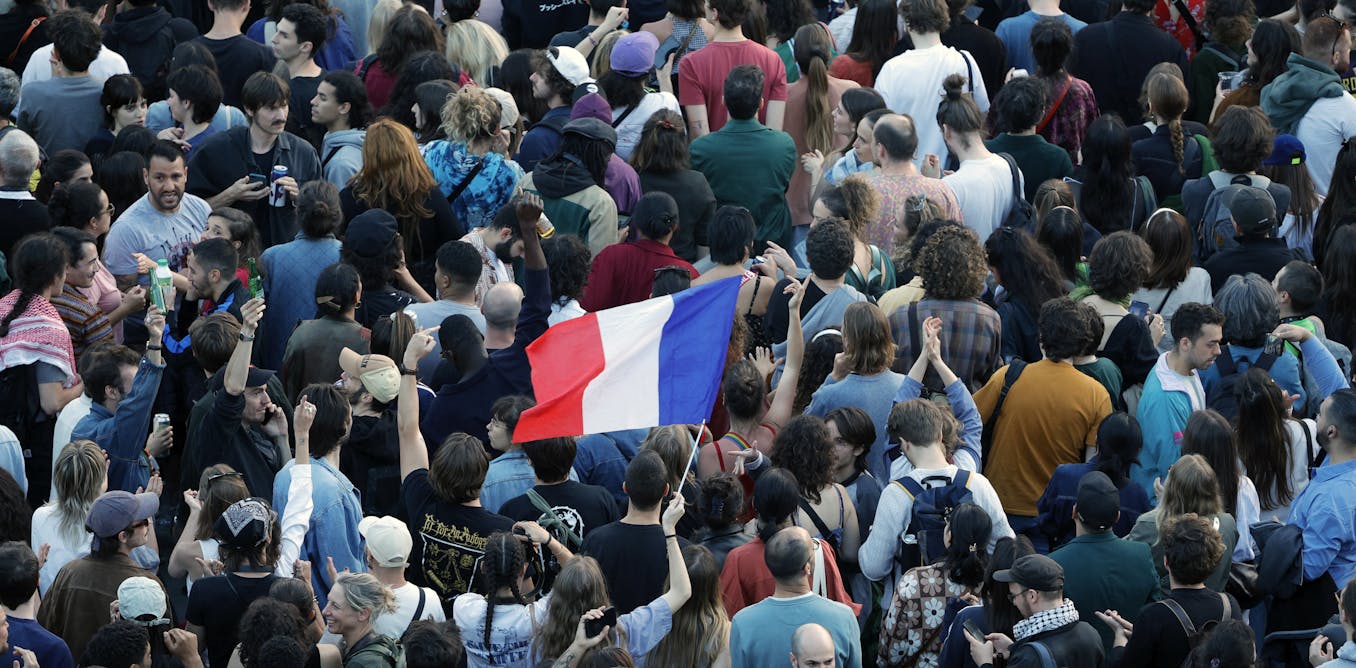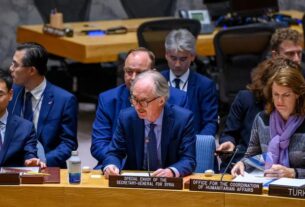The second round of French parliamentary elections on 7 July 2024 was a tense affair. Against all expectations, the left/progressive New Popular Front (Nouveau Front Populaire, NFP) won with 182 seats, followed by Macron’s party with 168 seats, and in third place, the far-right National Rally (Rassemblement National, RN) with 143 seats. Julien Robin, a doctoral student in political science specialising in French parliamentary life, analyses the results.
The Conversation France: What do the results of the second round of the legislative elections tell us?
Julien Robin: The fact that the New Popular Front came first and the Rassemblement National came third was really unexpected, given the latest forecasts and the number of seats won.
Having said that, what strikes me is that the RN has become more of a catch-all party, as Emmanual Macron’s “On the March” party was in 2017. The entire period between the two rounds revolved around the RN and the question of the “Republican front” – the principle that third-place candidates from parties other than the RN withdraw so that what would have been their votes can go to the non-RN candidate, and thus increase his or her chance to win. It worked, and without this, the RN would probably have obtained a strong relative majority and maybe even a slim absolute majority.
TCF: Are the results the confirmation that the organisation of political life into two blocs, the left and the right, is over?
JR: The results do show that there are three blocs of similar size. Emmanuel Macron dissolved the National Assembly to clarify things, but the result he obtained is exactly the opposite. The first reason is that the left has managed to unify in a short space of time. Macron’s party held its own, but compared to 2017 fell apart. This is the paradox of the dissolution: Macron assumed that the left coalition would implode, but in the end it held strong, and it was the right-wing family that was split between the former centrists and conservatives aligned with Macron, while others peeled off to align with the RN.
TCF: Can Macron’s party survive? Could we not see some progressive Macronists joining the New Popular Front or other centrist parties?
JR: One thing has changed a lot with the dissolution – ruling-party MPs had to be elected or re-elected on their own name, and some even wanted to remove Emmanuel Macron’s image or his name from election material. I’m not completely convinced that we’re going to see an implosion of the party, however. It’s more likely that Macronists from the left will choose to become independent and push forward texts or amendments on their own, and the same could happen with the party’s right wing. No matter what, Emmanuel Macron’s political mantra, popularised by the expression “at the same time”, has just taken a major blow.
**TCF: What does the abstention rate reveal? It’s higher than at the last legislative elections, but almost a third of the French people didn’t vote, despite the fact that the stakes being so high.
JR: Admittedly, the turnout has rebounded by 19.2 points compared with 2022, and it’s been 30 years since we’ve had such a rate. But let’s not forget that there are also 5% of French people of voting age who are not registered to vote. As a result, between 19 and 20 million French people did not vote.
TCF: What can be said about the votes between and within the blocs?
JR: The Republican front worked well, particularly for New Popular Front voters who did not hesitate to vote strongly for candidates against the RN: 70% of NFP voters in the first round voted for the right-wing candidate when there was a duel with the RN; 79% for the candidate aligned with Macron’s party.
Conversely, in duels with the RN, there was an uneven distribution of votes according to party label on the left: 54% of voters in the presidential camp in the first round voted for a candidate from the Socialist Party, Europe Écologie Les Verts (EELV) or the French Communist Party (PCF), but only 43% did so if it was a France Unbowed (La France Insoumise, LFI) candidate facing the RN.
TCF: In such a context, is it fair to say that power will shift from the Élysée [the presidential palace] to Matignon [the prime minister’s office]?
JR: Power will undoubtedly shift from the Élysée to Matignon, but above all to the National Assembly and the Senate, where the Republican right has a majority. Emmanuel Macron no longer holds all the cards when it comes to governing, and he is going to have to work with parliament and the other political groupings.
In this context, forming a government is not going to be easy. There are disagreements within the New Popular Front, and we’ll have to see what the balance of power is in terms of the number of MPs. Will a government with a relative majority be able to hold together? Right now, it’s hard to imagine a coalition government that includes the far-left LFI, mainstream progessive parties and the centre right.
TCF: Has France moved toward a parliamentary system?
JR: In a way, France is moving toward a kind of “atmospheric parliamentarianism”, a rather baroque form with three blocs and a voting system that can no longer guarantee a clear and stable majority. We’re not used to creating government coalitions in this way, because we don’t have this culture. What’s more, we remain in a presidentialist context, where the main leaders on the left and right are positioning themselves with a view to the 2027 presidential election. If there is a coalition, it will be with ulterior motives, which is not the best way to have one that works properly.
TCF: Could a coalition be a German-style government contract? Or is it possible to imagine a consensual prime minister, who seeks majorities text by text?
JR: To imagine a German-style scenario where, once the results are known, the parties negotiate a government contract seems unlikely to me. Today, everything is polarised and we mustn’t forget the role played by the presidential camp in this polarisation by governing with a great deal of arrogance.
A neutral political figure seems to me to be more of a possibility. In France we are more used to seeing a government operate with a relative majority than to assuming the creation of a grand coalition. That said, everything may change completely tomorrow and we will succeed in creating such a grand coalition.
TCF: These elections have seen the emergence of new political personalities. Is this a sustainable renewal?
JR: I think that in situations of crisis and instability, we have more confidence in people with political experience. Imagine: former president François Hollande, who was declared to be a political goner in 2017, is now back in the National Assembly. New personalities can certainly have an influence in the coming months, but don’t forget that Marine Tondelier (EELV) and Jordan Bardella (RN) aren’t MPs in Paris, whereas Marine Le Pen and François Hollande both will be.
Interview by Christophe Bys, translated by Leighton Kille.



